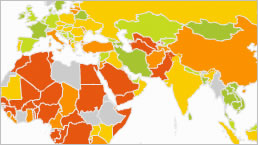Financial institutions, policy makers, investors, fin-tech companies, and regulators from 45 countries gathered recently in Izmir, Turkey, to look at innovative solutions for financing new enterprises at scale.
The Turkish G20 Presidency and the Global Partnership for Financial Inclusion (GPFI) organized the two-day global workshop, Financing Entrepreneurship: Innovative Solutions, held on June 1-2, 2015.
The event showcased new innovations and technology developments that are creating opportunities to accelerate small business formation and growth. About 165 attendees discussed cutting-edge practices and enabling environment reforms needed to overcome obstacles to successfully financing new enterprises at a significant scale.

Following panel discussions, participants identified the most promising innovative solutions for increasing financing to small- and medium-enterprises (SMEs) in emerging markets. They are:
- Create enabling regulatory environment that promotes financial inclusion (such as via mobile services and underwriting models), allows banks and non-bank financial institutions to better serve small- and medium-enterprises (SMEs).
- Promote the development of open platforms to lower costs of joining ecommerce and supply chains by SMEs, and costs of using this data to lower costs of financial services offerings to SMEs who join these platforms.
- Increase private partnerships between banks, fintechs and other players to scale beyond what either could do on their own.
- Improved basic financial markets infrastructure to support long term investment, including sound secured transactions regimes, insolvency regimes, and inclusive, comprehensive credit information.
- Digitize information within banks and other sources to use to understand customers, market through mass customization, make credit decisions and increase processing efficiency.
- Develop new ways of securing loans, moving beyond reliance on fixed collateral (moveable collateral registry, alternative data (including psychometrics), etc.
- Take an ecosystem perspective more routinely, such as addressing collateral requirements, sources of underwriting data, nonfinancial services, etc. to serve SMEs, especially start-ups, women and youth-owned enterprises.
- Proportional regulation to encourage longer term financial products, particularly asset based products, and to allow mobilization of capital from institutional investors for these products.
- Increase the availability of nonfinancial services for entrepreneurs (entrepreneurship training, mentors, networking, financial literacy, etc.)
- Establish (require?) national SME strategies to ensure SME’s real needs are met in coordinated, efficient way to scale up their success.
- Harmonize regulation and public policy: re-balance current post-crisis regulations to incentivize investing in SMEs/real economy while still protecting safety and soundness.
- Simplify acceptance (support new underwriting models) so that more SMEs can accept electronic payments of all sorts (card, internet, mobile, etc.)
- Provide incentives for large corporates in supply chains to put skin in the game for financing SMEs in these chains.
- Address policies from perspective of what benefits SMEs in general, but ensure that women and youth-entrepreneurs benefit especially.
The workshop was followed by the GPFI meeting on June 3, 2015 and the G20 Development Working Group (DWG) meeting on June 4-5, 2015. The outcomes of the workshop were shared with relevant stakeholders during the GPFI meeting and laid the ground for the GPFI’s future work. In addition, work agendas for the GPFI Subgroups were reviewed and the way forward was discussed. The outcomes of the workshop and the overall GPFI meeting have been reported to the DWG members.


